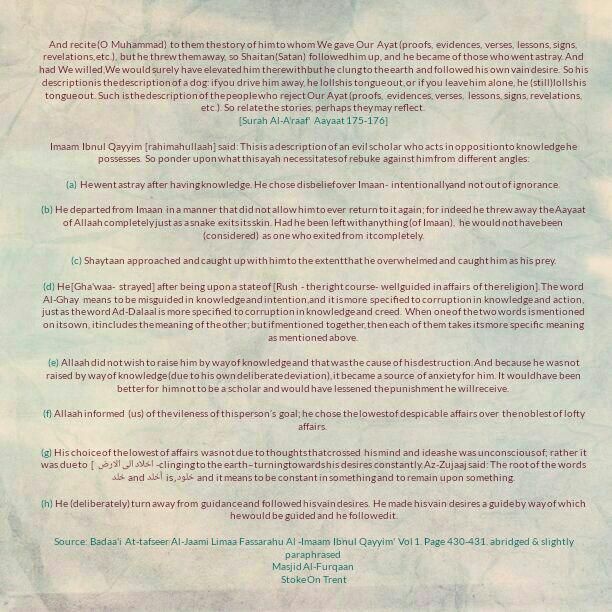
[4] Conclusion: A Description of the One Who Abandoned Knowledge of the Book and Preferred the Dunya over the Aakhirah [Summarized Benefits from Imaam Ibnul Qayyim (rahimahullaah)]
This is a description of an evil scholar who acts in opposition to knowledge he possesses. So ponder upon what this ayah necessitates of rebuke against him (i.e. the person mentioned in Soorah Al-Araaf. Aayaat 175-176) from different angles:
(a) He went astray after having knowledge. He chose disbelief over Imaan- intentionally and not out of ignorance.
(b) He departed from Imaan in a manner that did not allow him to ever return to it again; for indeed he threw away the Aayaat of Allaah completely just as a snake exits its skin. Had he been left with anything (of Imaan), he would not have been (considered) as one who exited from it completely.
(c) Shaytaan approached and caught up with him to the extent that he overwhelmed and caught him as his prey.
(d) He [غوى-strayed] after being upon a state of [الرشد-the right course- well guided in affairs of the religion]. The word [الغي] means to be misguided in knowledge and intention, and it is more specified to corruption in knowledge and action, just as the word [الضلال] is more specified to corruption in knowledge and creed. When one of the two words is mentioned on its own, it includes the meaning of the other; but if mentioned together, then each of them takes it’s more specific meaning as mentioned above.
(e) Allaah did not wish to raise him by way of knowledge and that was the cause of his destruction. And because he was not raised by way of knowledge (due to his own deliberate deviation), it became a source of anxiety for him. It would have been better for him not to be a scholar and would have lessened the punishment he will receive.
(f) Allaah informed (us) of the vileness of this person’s goal; he chose the lowest of despicable affairs over the noblest of lofty affairs.
(g) His choice of the lowest of affairs was not due to thoughts that crossed his mind and ideas he was unconscious of; rather it was due to [إخلاد إلى الأرض clinging to the earth–turning towards his desires constantly. Az-Zujaaj said: The root of the words [خلد and أخلد] is [خلود], and it means to be constant in something and to remain upon something.
(h) He (deliberately) turn away from guidance and followed his vain desires. He made his vain desires a guide by way of which he would be guided and he followed it.
[Source: بدائع التفسير الجامع لما فسَّره الإمام ابن القيم الجوزية Abridged and slightly paraphrased. Vol 1. Page: 430-431]
We ask Allaah to guide us in our actions, creed and intentions. And we ask Allaah to attach us to the upright scholars–those who act upon the knowledge they possess. Aameen
Part 1:
http://salaficentre.com/2014/07/1-a-description-of-the-one-who-abandoned-knowledge-of-the-book-and-preferred-the-dunya-over-the-aakhirah-summarized-benefits-from-imaam-ibnul-qayyim-rahimahullaah/
Part 2:
http://salaficentre.com/2014/08/2-a-description-of-the-one-who-abandoned-knowledge-of-the-book-and-preferred-the-dunya-over-the-aakhirah/
Part 3:
http://salaficentre.com/2014/08/3-a-description-of-the-one-who-abandoned-knowledge-of-the-book-and-preferred-the-dunya-over-the-aakhirah-summarized-benefits-from-imaam-ibnul-qayyim-rahimahullaah/